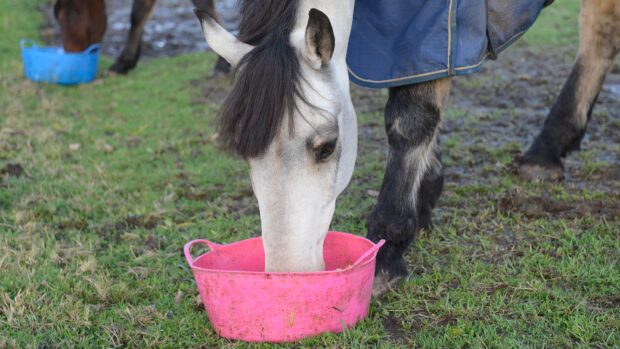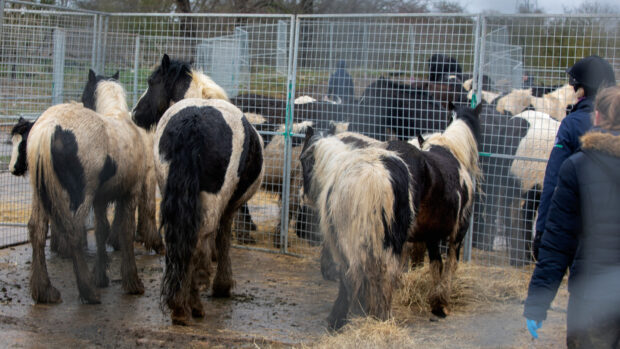Willie Sheret, the much-loved showjumper, trainer and author, known for his mantra, “keep going clear”, died on 18 April, aged 96.
A man not defined by loud pronouncements or modern celebrity, Sheret instead built a reputation that spanned decades through steadfast consistency, uncompromising standards, and an instinctive understanding of both horses and people. He was not only a champion rider and revered coach, but also a resilient working-class Glaswegian whose horsemanship transcended boundaries of geography, class, and time.
Sheret’s legacy, particularly in showjumping, is profound. He was best known for his 1975 triumph at the Horse of the Year Show, where he won the prestigious Foxhunter championship at Wembley Arena on, St Corry. One of very few Scots to claim that title, it represented the high-water mark of a competitive career forged not in privilege but through sheer application and years of hard-earned experience. But the Foxhunter win, though historic, was not an isolated pinnacle. It was emblematic of Sheret’s broader contribution — as a rider, a trainer, and an intuitive horseman whose eye for equine potential was matched by an unshakable belief in improvement through repetition and care. “Keep Going Clear”, the title of the book he would later co-author with his son David, was more than a phrase. It was a mantra.
Born in 1928 in Bridgeton, Glasgow, William “Willie” Shaw Sheret came from modest means. His father was a coalman, and it was among Glasgow’s working horses that his early affection for animals took root. Leaving school at 14, he worked as a scrap merchant and cinema projectionist before undertaking National Service in Berlin in the aftermath of the Second World War. It was there, stationed near the Olympic Stadium, that fate intervened. Tasked with looking after military stables, Sheret came under the mentorship of German showjumper Otto Klitzki, an experience that would lay the technical foundations for a life in showjumping.
Training horses
Returning to Scotland in 1949, he embarked on a professional equestrian career spanning eight decades. From Bearsden to Howwood and ultimately Dykehead Farm in Ayrshire, Sheret’s stables became places of transformation not just for horses, but for generations of young riders. Notably, he trained horses that would go on to Olympic-level success, including those ridden by Harvey Smith and Aileen Ross (later Lady Fraser). His reputation grew not through self-promotion but through consistent delivery. He had an uncanny ability to bring through the horses that others had written off: difficult, unpredictable, or simply misunderstood. Sheret, without fuss, would listen to them then patiently bring them to form. His methods were rigorous but rooted in empathy.
Throughout his life Sheret maintained a dual identity; part competitor, part coach. But it is perhaps as a teacher that his influence will endure longest. Even into his nineties, he continued mentoring young riders, offering corrections and encouragement in equal measure. He believed in honesty, effort, and preparation. Riders under his tutelage learned more than technique, they absorbed values. His instruction was underpinned by a calm authority, a measured tone that never sought to intimidate but rarely missed the mark.
One former pupil recently reflected: “Willie could raise a fence without you seeing it and raised your confidence the same way.” His stables were never run for prestige but for purpose. They were practical environments; horses to muck out, fences to rebuild, lorries to fix – and he led by example. He did not demand standards he wouldn’t meet himself. In an era increasingly obsessed with appearance and social media presence, Sheret remained anchored to performance and process.
Recognition in sport
Sheret’s contribution to the sport was formally acknowledged in 2005, when he was appointed MBE for services to showjumping in Scotland by Queen Elizabeth II. It was a rare moment of national recognition for a man who had long commanded the respect of peers without courting the spotlight. He also served as honorary vice president of British Showjumping Scotland, attended the Royal Highland Show as competitor, steward, and sponsor, and in 2020 received the HorseScotland national lifetime achievement award, all milestones that traced a career of cumulative excellence, rather than isolated brilliance. That same year, aged 91, he was still actively discussing training philosophies and critiquing rounds from his seat by the paddock. Indeed, he taught and still drove his car until he was 95 years of age.
In person, Sheret was a study in understated charisma. Fiercely intelligent but humble, disciplined but humorous, he carried the authority of someone who had nothing to prove and everything to give. He was known for handing out Polo mints to horses, and tea and anecdotes to friends.
He rarely spoke ill about hardship, but he understood it. He lost his beloved wife, Marjory, in 2009, and his son, Gavin, in 2020 – yet continued to embody resilience. In 2013, he moved to Aberdeenshire to live with his son David. He thrived in the rural setting, surrounded by dogs, family, and a local equestrian centre that welcomed him as kin. His daughter Diane, too, remained a vital presence in his life, and he adored her children and grandchildren.
In later years, Sheret embraced travel with the same curiosity he brought to horses; New York, Berlin, Portugal, Spain, San Antonio, Colorado, New Orleans. Each trip a story. Each return, a reminder of home.
Keep going clear
At the time of his passing, Sheret had amassed over 25,000 followers on Facebook – staggering testament not to viral content, but to enduring connection. In the days following his death, tributes flooded in. Words that came up time and again included “gentleman, legend, teacher, mentor, friend, horseman, kindness.”
They capture the essential paradox of Willie Sheret’s life: an extraordinary man who lived an ordinary life with uncommon excellence. There will always be riders who owe a clear round to Willie. Horses who jumped because he believed in them. Lives that steadied because he showed how.
He was our dad, our coach, our compass – and he was truly great.
And, as many from across the sport simply wrote: Keep going clear, Willie.
- To stay up to date with all the breaking news from major shows throughout 2025, subscribe to the Horse & Hound website




